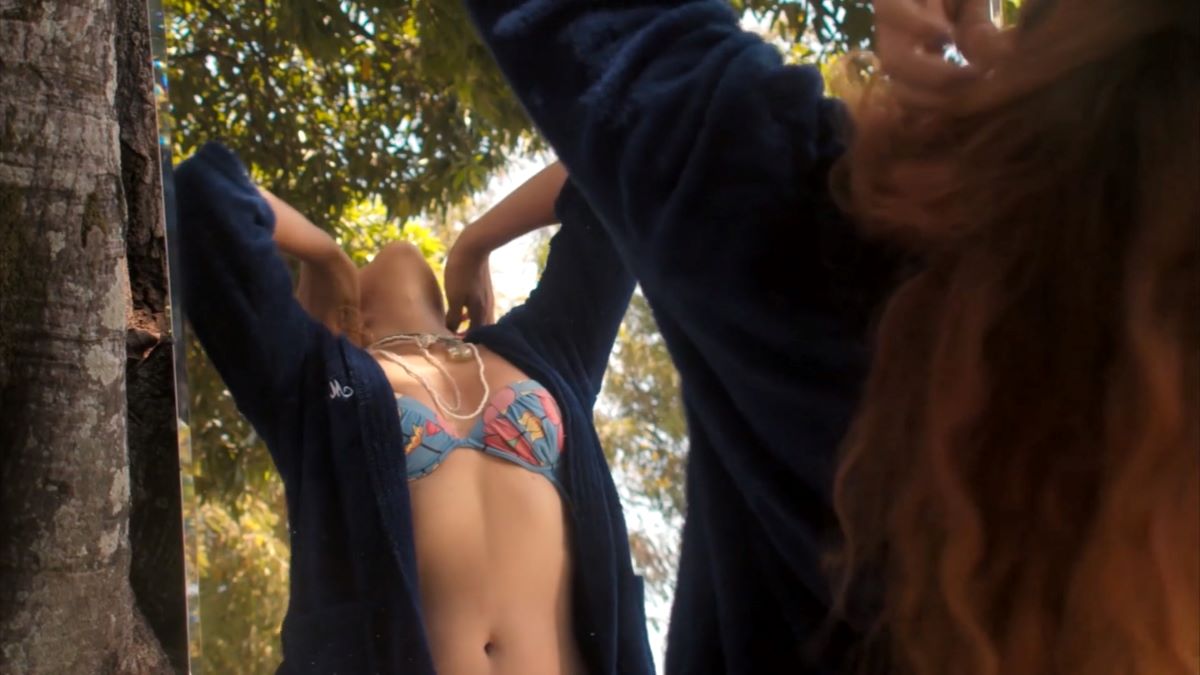Catalogue > At random

Jonathas De Andrade
Olho da Rua
Film expérimental | 4k | couleur | 25:13 | Brésil | 2022
Starring a cast of 100 people, Olho da Rua (Out Loud) is divided into eight acts and presents performance propositions in front of the camera as exercises of the gaze. Simple actions are presented, such as looking and admiring oneself in front of a mirror, improvising an assembly and saying messages to the camera, representing a collective party making the public square a great stage, or facing the camera lens that it's the eye of the beholder, whether on the streets or on the movie screen when it's ready. Made in two days at Praça do Hipódromo, in Recife, the film is made up of a cast of homeless people, linked to public shelters and non-governmental initiatives to support the vulnerable population.
Jonathas de Andrade was born in Maceió, Brazil, in 1982, and studied communications at the Universidade Federal de Pernambuco, Recife. He works with installation, photography, and video to explore constructs of love and the process of urbanization, with particular emphasis on Brazil’s vibrant but often ignored northeast region. De Andrade’s series Love and Happiness in Marriage (Amor e Felicidade no Casamento, 2007) juxtaposes photographic portraits of a young couple with pages from a 1960s psychiatric textbook on love and marriage. What appear to be vintage shots are actually new images of contemporary actors, their treatment and combination framing the popular ideals of romance and family as bourgeois fictions. In 2 in 1 (2 em 1, 2010), diagrams and photographs of carpenters illustrate the process of converting two single beds into a double and also seem to offer functional instruction on how to “make” a couple. Tropical Hangover (Ressaca Tropical, 2009) also employs found material, in this case a salvaged diary that forms the basis for an installation in which a book’s pages are illustrated with original, vintage, and found photographs, offering a reflection on memory, modernity, and urban space. Since 2007, many of de Andrade’s ideas have been developed in collaboration with A Casa como Convém (The House as It Should Be), an artists’ collective that he founded with Cristiano Lenhardt and others in Recife. The group, which focuses on issues around tropical modern architecture, offers a valuable counterpoint to the dominant cultural axis of São Paulo and Rio de Janeiro. One example of the influence of collectivity and local community on de Andrade’s work is The Uprising (O Levante, 2012), for which the artist organized a horse-drawn cart race in the center of Recife. Also inspired by the town is De Andrade’s mural Nostalgia, a Class Sentiment (Nostalgia, Sentimiento de Classe, 2012). This work, constructed from 340 primary-colored geometric fiberglass tiles displayed in a segmented composition, reproduces a tiled panel in a Recife tropical modern house, and is shown opposite a vinyl text that quotes manifestos about modern life composed by two Brazilian architects of the 1960s and ’70s. Some of the tiles interrupt these texts, the suggestion of loss offering pointed comment on the failure of Brazil’s modernist project. De Andrade has had solo exhibitions at Instituto Cultural Itaú, São Paulo (2008); Instituto Cultural Banco Real, Recife (2009); Centro Cultural São Paulo (2010); Kunsthalle Lissabon, Lisbon (2013); and Musée d’art Contemporain de Montréal (2013). He participated in the group exhibitions When Attitudes Became Form Become Attitudes, CCA Wattis Institute for Contemporary Art, San Francisco; and Salvajes: Digesting Europe Piece by Piece, Traneudstillingen Exhibition Space, Copenhagen (both 2012); and EXPO 1: Rio, Museu de Arte Moderna de Rio de Janeiro; Love and Hate to Lygia Clark, Zach?ta National Gallery, Warsaw; HIWAR, Conversations in Amman, Darat al Funun, Amman, Jordan; My Third Land, Frankendael Foundation, Amsterdam; Imagine Brazil, Astrup Fearnley Museet, Oslo; La Bienal 2013: Here is where we jump, El Museo del Barrio, New York; and Moving: Norman Foster on Art, Carré d’Art, Musée d’Art Contemporain, Nîmes (all 2013). He participated in the Mercosul Biennial, Porto Alegre, Brazil (2009); São Paulo Biennial (2010); Sharjah Biennial, United Arab Emirates (2011); Istanbul Biennial (2011); New Museum Triennial: The Ungovernables, New York (2012); and Lyon Biennial (2013). De Andrade lives and works in Recife.